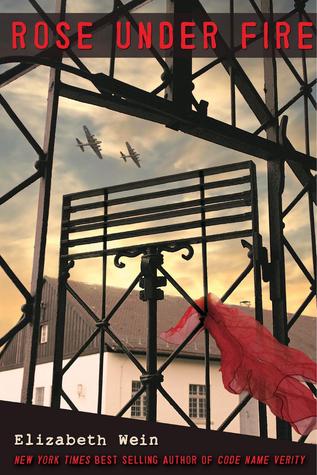I so appreciate authors who are willing to go
into the dark brutality humans experience and unearth something salvageable. I
did not read Code Name Verity, the Printz Award winner by the same
author, but Rose Under Fire takes readers to the Holocaust in brutal, life-altering ways and yet resilience, surviving remains viable, possible. Somehow.
Rose Under Fire is a fabulous read, clocking in over 350 pages without a word
written in waste. The story spellbinding, the characters well developed, the underlying
tension familiar: this book engulfed me. Tom Newkirk writes in his book, The
Art of Slow Reading, about how authors trust us readers to bring all of
ourselves to the books we read. They
trust us. That was a really stark and powerful note for me. As I read Rose Under Fire, I thought about Newkirk's message, about how Wein wants me (the reader) to bring all of myself into her story. Honestly that is not easy: the main character Rose is captured by the Nazis and sent to Ravensbruck, the well-known concentration camp. There she discovers what and how to live through atrocities unknown to many. While Wein created the main character, she did not make up the atrocities. The humans used for experiments, the gas chamber stories, the standing at attention for days, the extreme lack of food/water/warm clothes....the list feels endless. But to trust me to enter such grim vile ways of existing, to allow me to walk with Rose as she finds others who secretly send her messages, who notes in her unique and quietly powerful ways that life remains worth living, that there isn't a question about getting out.
Readers find on the opening pages of the book the 74 names of the women whose bodies were literally experimented on at Ravensbruck. The other 350+ pages tell a story that I found heartbreaking, disturbing, and confusingly survivable, truthful, familiar, and utterly tragic. How is it that humans can make it through such grim moments? How do people survive what appears to be unsurvivable? Wein takes us there...and beyond.
Readers find on the opening pages of the book the 74 names of the women whose bodies were literally experimented on at Ravensbruck. The other 350+ pages tell a story that I found heartbreaking, disturbing, and confusingly survivable, truthful, familiar, and utterly tragic. How is it that humans can make it through such grim moments? How do people survive what appears to be unsurvivable? Wein takes us there...and beyond.

No comments:
Post a Comment